Money and the Mechanism of Exchange
By William Stanley Jevons
In preparing this volume, I have attempted to write a descriptive essay on the past and present monetary systems of the world, the materials employed to make money, the regulations under which the coins are struck and issued, the natural laws which govern their circulation, the several modes in which they may be replaced by the use of paper documents, and finally, the method in which the use of money is immensely economized by the cheque and clearing system now being extended and perfected.This is not a book upon the currency question, as that question is so often discussed in England. I have only a little to say about the Bank Charter Act, and upon that, and other mysteries of the money market, I refer my readers to the admirable essay of Mr. Bagehot on
“Lombard Street,” to which this book may perhaps serve as an introduction. [From the Preface]
First Pub. Date
1875
Publisher
New York: D. Appleton and Co.
Pub. Date
1876
Comments
Westminster (authorized) edition.
Copyright
The text of this edition is in the public domain. Picture of William Stanley Jevons: Photogravure after a photograph of W. Stanley Jevons, taken by Maull & Co., London., courtesy Liberty Fund, Inc.
- Preface
- Chapter I. Barter
- Chapter II. Exchange
- Chapter III. The Functions of Money
- Chapter IV. Early History of Money
- Chapter V. Qualities of the Material of Money
- Chapter VI. The Metals as Money
- Chapter VII. Coins
- Chapter VIII. The Principles of Circulation
- Chapter IX. Systems of Metallic Money
- Chapter X. The English System of Metallic Currency
- Chapter XI. Fractional Currency
- Chapter XII. The Battle of the Standards
- Chapter XIII. Technical Matters Relating to Coinage
- Chapter XIV. International Money
- Chapter XV. The Mechanism of Exchange
- Chapter XVI. Representative Money
- Chapter XVII. The Nature and Varieties of Promissory Notes
- Chapter XVIII. Methods of Regulating a Paper Currency
- Chapter XIX. Credit Documents
- Chapter XX. Book Credit and the Banking System
- Chapter XXI. The Clearing-House System
- Chapter XXII. The Cheque Bank
- Chapter XXIII. Foreign Bills of Exchange
- Chapter XXIV. The Bank of England and the Money Market
- Chapter XXV. A Tabular Standard of Value
- Chapter XXVI. The Quantity of Money Needed by a Nation
The Clearing-House System
Chapter XXI
By means of the London agency system, the banking transactions of the country are, as we have seen, brought to a focus in the city of London. The settlement of the reciprocal claims of the twenty-six principal city banks is therefore a business of the utmost magnitude and importance, representing as it does the completion of the business of no small part of the world. In a room of moderate dimensions, entered from a narrow passage running from the post-office in King William Street across to Lombard Street, debts to the average amount of nearly twenty millions sterling per day are liquidated without the use of a single coin or bank-note. In the classic financial neighbourhood of Lombard Street, and even in this very chamber, the system of paper commerce has been brought nearly to perfection. The early history of the London Clearing House is buried in obscurity, and it is much to be desired that those who are acquainted with the principal incidents in its progress should put them on record before it is too late.
The Clearing House appears to have been first created just a century ago. About the year 1775 a few of the city bankers hired a room where their clerks could meet to exchange notes and bills, and settle their mutual debts. The society was of the nature of a strictly private club, the public knowing nothing about it, and the transactions being conducted in perfect secrecy. Mr. Gilbart tells us that, even in this form, it was regarded as a questionable innovation, and some of the principal bankers refused to have anything to do with it. By degrees, however, the convenience of the arrangement made itself apparent, more bankers were admitted to the society, and a distinct committee and set of rules were formed for its management. Although it remains to the present day a private and voluntary association, unchartered, and in fact unknown to the law, the Clearing House has steadily grown in importance and in the publicity of its proceedings.
Several important extensions of the clearing work have been made in the last twenty-five years. After the rise of the London Joint Stock Banks, subsequent to 1833, they were for a long time refused admittance to the Clearing House; but in June, 1854, they were at last allowed to join the association. The Bank of England long remained entirely outside of the confederation, but more recently it has become a member, so far as regards the presentation of claims upon other banks. The West End banks of London are still beyond its sphere, partly, perhaps, because their distance stands in the way of the working of the system. They are thus in the position of provincial banks, and can clear through city agents like provincial banks.
Before the year 1858 the business of the Clearing House was restricted to the exchange of cheques and bills actually drawn on the clearing bankers. Country bankers receiving cheques drawn upon other distant country banks were in the habit of remitting them direct by post, the paying bank effecting the payment by directing their London banker to pay the amount to the London agent of the receiving bank. In the year 1858, at the suggestion of Mr. William Gillett, but chiefly by the exertions of Sir John Lubbock, the country clearing system was organized. The country banker, instead of posting many cheques every day to all parts of the kingdom, sends them in a single parcel to his London agent, to be presented through the Clearing House on the London agents of the paying banks. This exchange is made, as we shall see, at different hours of the day, but the results are summed up in the general balance of the day’s transactions.
Transaction of Business at the London Clearing House.
There are three clearings daily at the Lombard Street House. The morning clearing opens on ordinary days at 10.30; drafts are received not later than 11, and the work must be closed at noon. The country clearing then begins, drafts being received until 12.30, and the clearing closed at 2.15. The heaviest clearing, however, is that of the afternoon, which begins at 2.30. The bustle and turmoil of the work grow to a climax at four o’clock, the runners rushing in with the last parcels of drafts, up to the moment when the door is finally closed. On the fourth day of each month, when the heaviest work occurs, the hours are extended, the House opening at nine o’clock.
The Clearing House is a plain oblong room, with rows of desks in compartments round three sides, and down the middle. A small office for the two superintendents stands at one end. Each bank sends as many clerks to the House as may be requisite for the rapid completion of the work, and some banks have as many as six clerks. The cheques and bills to be presented by any one clearing banker, say the Alliance Bank, upon any other clearing banker, are entered at home in the “Out-clearing book,” and are then sorted into twenty-five parcels, one of which is to be presented on each of the other clearing banks. On reaching the Clearing House, these parcels are distributed round the room to the desks of the clerks representing the several paying banks, who immediately begin to enter them in the “In-clearing books” in columns bearing at the head the name of the presenting bank. After being entered, the drafts are, as soon as possible, forwarded to the banking house for examination and entry in the bank books. Any cheques or bills refused payment are called “returns,” and can generally be sent back to the Clearing House the same day, and entered again as a reverse claim by the bank dishonouring them on the banks which presented them. At the close of the day the clerks of the Alliance Bank are able to add up the whole of the claims which have been made upon them by the other twenty-five banks, and they learn from the out-clearing book the amount of the claims which the Alliance Bank is making on other banks. The difference is the balance which the Alliance Bank has either to pay or receive as the case may be. These balances being communicated to the superintendents of the House are by them inserted in a kind of balance sheet. When finally added up, the debtor and creditor sides of the sheet should exactly balance, because every penny to be received by one bank must be paid by another.
In former years the balance due by or to each bank was paid in bank-notes, and in the year 1839, average daily transactions to the amount of about three millions were cleared by the use of £200,000 in bank-notes, and £20 in coin, or about one-fifteenth part of the debts liquidated. More recently a suggestion of the late Charles Babbage was carried into effect, and the balances were paid by drafts upon the Bank of England, in which bank each city banker deposits a large part of his spare cash.
One ingenious minor arrangement in the London Clearing House is the division of the whole list of twenty-six bankers into three groups, in such a way that one of the clearing clerks of the Alliance Bank corresponds with one group of the other banks, a second clerk with the second group, and so on. Thus when a comparison or correction of accounts is made between any two banks, it is known precisely which clerk must answer to the questions called across the room.
Although the rapid and effective way in which the settlement is carried out in the London Clearing House must always excite surprise, it is quite open to question whether improvements are not needed. The room did not seem to me large enough for the convenient and wholesome transaction of such vast and increasing work. Although some banks employ as many as six clerks, the pressure is very great at times. The facility which these clerks acquire by practice in making and adding up entries is very great, but the intense head work performed against time, in an atmosphere far from pure, and in the midst of bustle and noise arising from the corrections shouted from one clerk to another across the room, must be exceedingly trying. Brain disease is occasionally the consequence.
The question must arise, too, whether the privilege of clearing is to be for ever restricted to twenty-six principal city banks, when there are certainly many other banks existing or being founded which need the convenience of access to the House. In New York the clearing circle, as we shall see, is much wider. At present the minor London banks are forced to employ the clearing bankers as agents, or to forego the advantages of the Clearing House altogether. It is hardly just or possible that a narrow monopoly of the sort should be maintained for ever.
Manchester Clearing House.
Though the London Clearing House is entirely the birthplace of the system, and the spot where the work has been organized on the largest scale, it does not follow that it is in every respect the most suitable for imitation in commercial towns of less magnitude. At least two English provincial towns, Manchester and Newcastle, have established local clearing horses. The bankers of Liverpool, also, I am told, have recently arranged a private system of clearing among themselves; and it is possible that the bankers of other towns may have taken a similar step without the fact becoming generally known. Through the kindness of some members of the committee, I have received full information as to the working of the Manchester Clearing House. The business seems to have been arranged, chiefly, I believe, by Mr. E. W. Nix, with great success, and it may be useful to describe the arrangements in detail as they would be very suitable for adoption in many English, foreign, or colonial towns, which will doubtless before long establish clearing houses.
In the Manchester Clearing House the work is performed entirely upon loose forms, and not in account-books, as in London. Though these forms may seem rather numerous and elaborate, they greatly assist in the accurate and orderly settlement of the balance. The clearing clerk, before leaving his bank, sorts out the drafts, which he has to deliver, into thirteen parcels, one for each of the thirteen other banks, and then fills up thirteen lists, one for each parcel, in the Form No. 1 shown below, each cheque being represented only by the amount of money expressed in it. A copy of the list is entered in one of the books of the bank provided for the purpose.
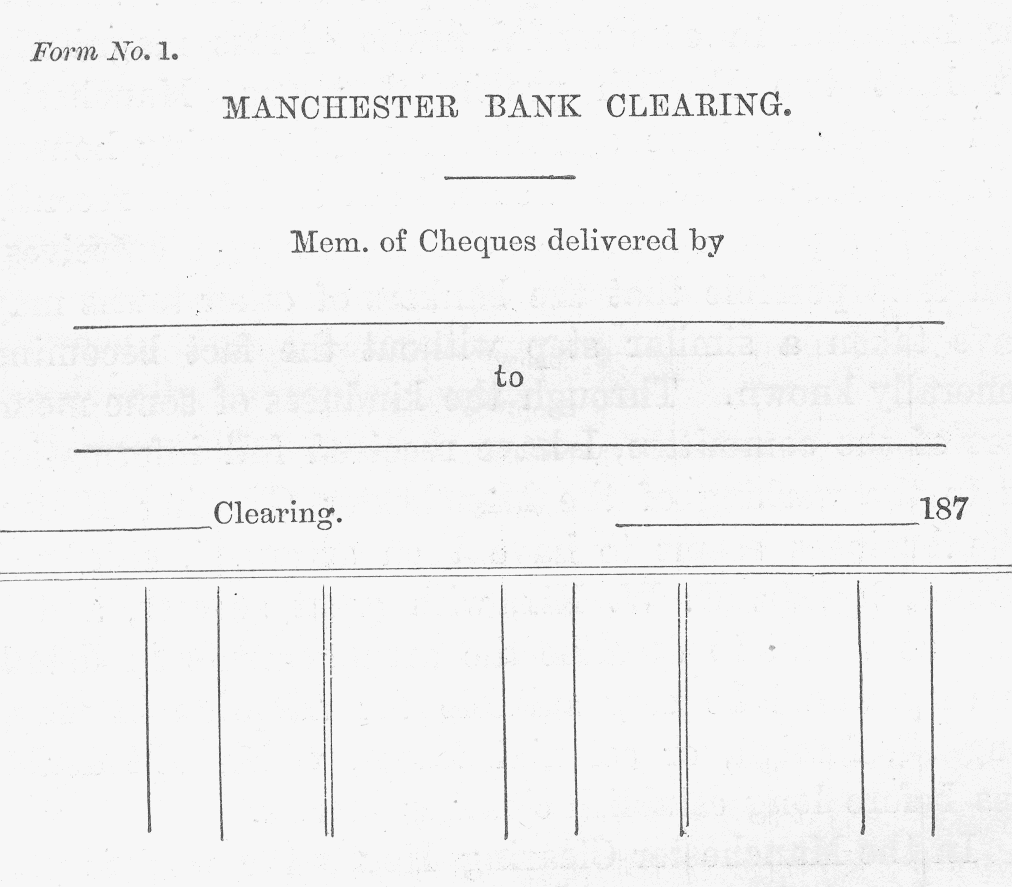
Adding up each such list, he inserts the totals in one of the left-hand columns of the Form No. 2. He thus obtains a complete abstract of all the claims he holds upon other banks, and adding up the columns ascertains the aggregate “Out-clearing.”
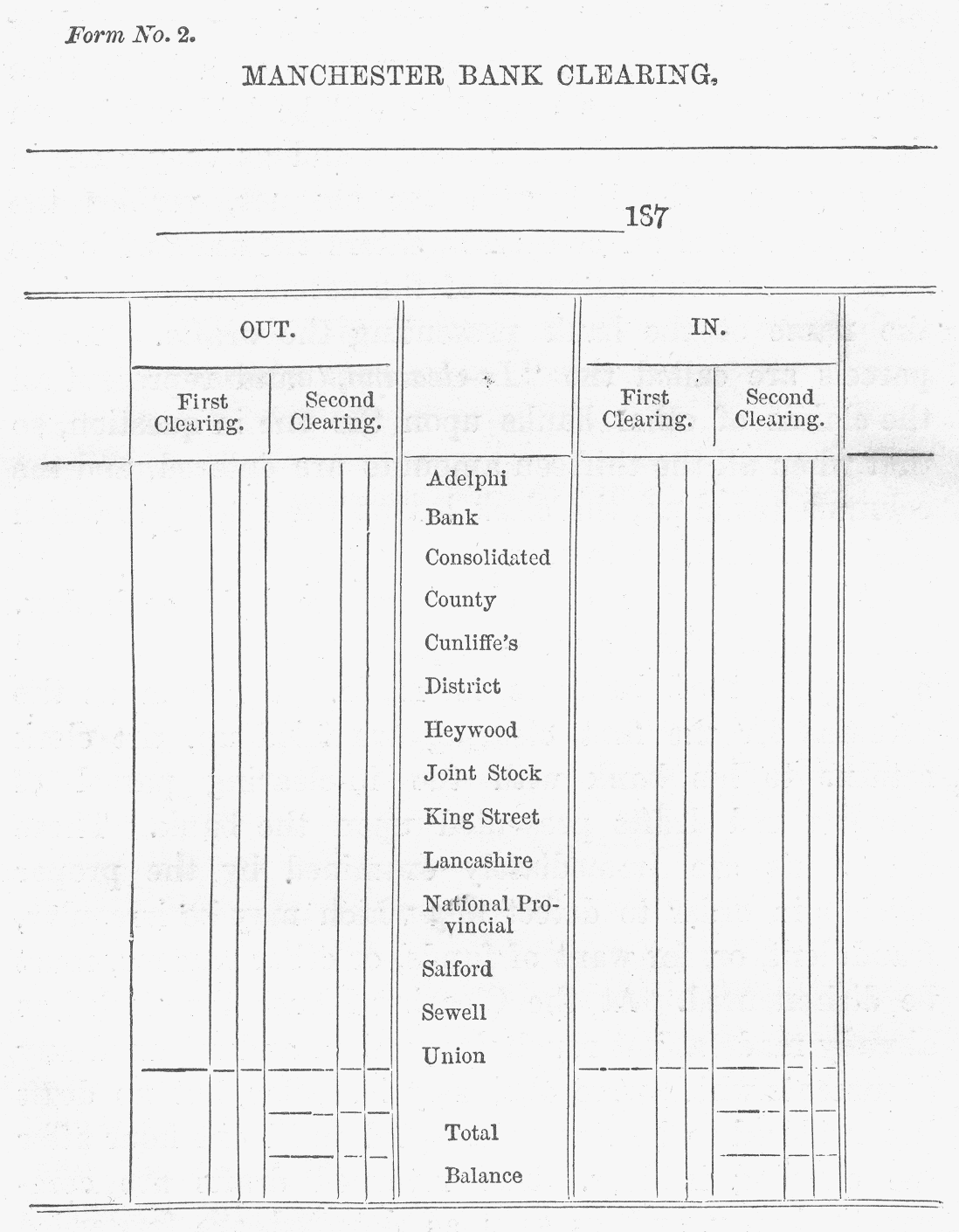
On reaching the Clearing House, the clerk walks round the room and lays on the desk belonging to each other bank the parcel of cheques and the corresponding list already described. In the course of a little time thirteen similar parcels and lists will be laid on his own desk by the clerks of other banks, and as they come in he compares the list with the cheques, verifies the addition, and if all be correct, enters the amount in one of the right-hand columns of the second form, against the name of the bank presenting the drafts. These parcels are called the
“In-clearing,” and represent all the claims of other banks upon the one in question, so that when all the thirteen amounts are entered, and the columns added up, the clerk learns the aggregate which his bank will have to pay.
At Manchester two clearings are held each day. The first at 11.15 a.m. is a preliminary one only, and no payment of balances is made. As soon as the columns for the first clearing are filled up, the clerk returns to his bank with the in-clearing parcel of cheques and drafts presented upon the bank. These documents are immediately examined by the proper officials in order to detect any which may be irregular, fraudulent, or, for want of funds, or other reasons, must be dishonoured. At the Clearing House the clerk has already made a first rough inspection, and returned any documents which were obviously irregular, but no draft is considered to be finally accepted until one hour after the clearing is over. The returned drafts are comparatively few, and, as soon as detected, are forwarded direct to the bank presenting them.
The second clearing takes place at 2.15 p.m, and is conducted just as in the morning. The second columns of the out- and in-clearing, in Form 2, having been filled and summed up, the totals of the first columns are added in, and the clerk learns the sum that has to be paid, and at the same time to be received, by his bank. The difference is the balance which he has either to receive or pay. These totals and the balance he copies into the following brief form, No. 3, which he hands to the inspector of the Clearing House.
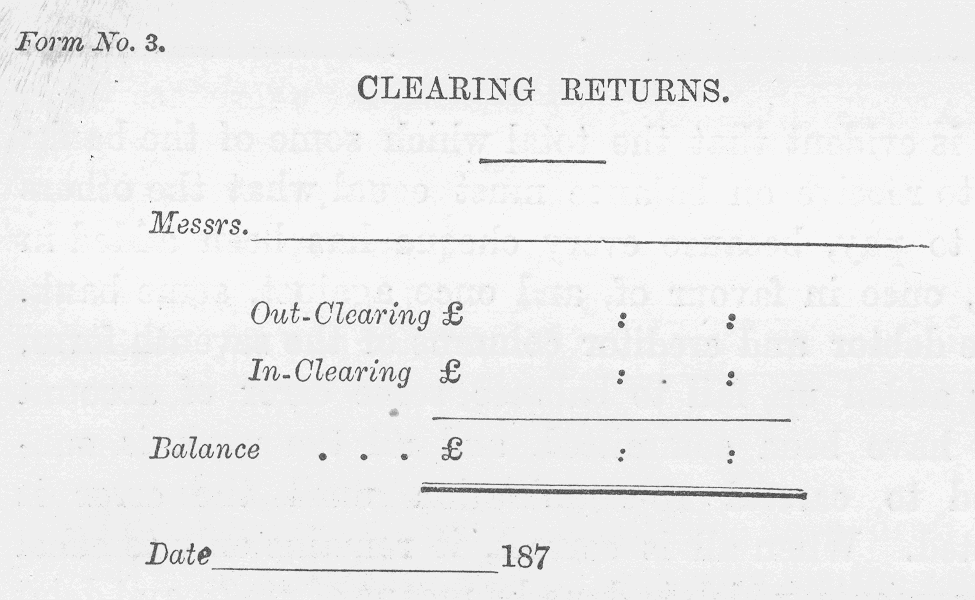
The inspector now proceeds to verify the balances by inserting the amounts in Form No. 7, given on the next page, in an abbreviated form, only four of the names of the banks being inserted, to save space. In these forms the names of the banks are given in the briefest manner, and the Branch Bank of England is called simply “Bank.”
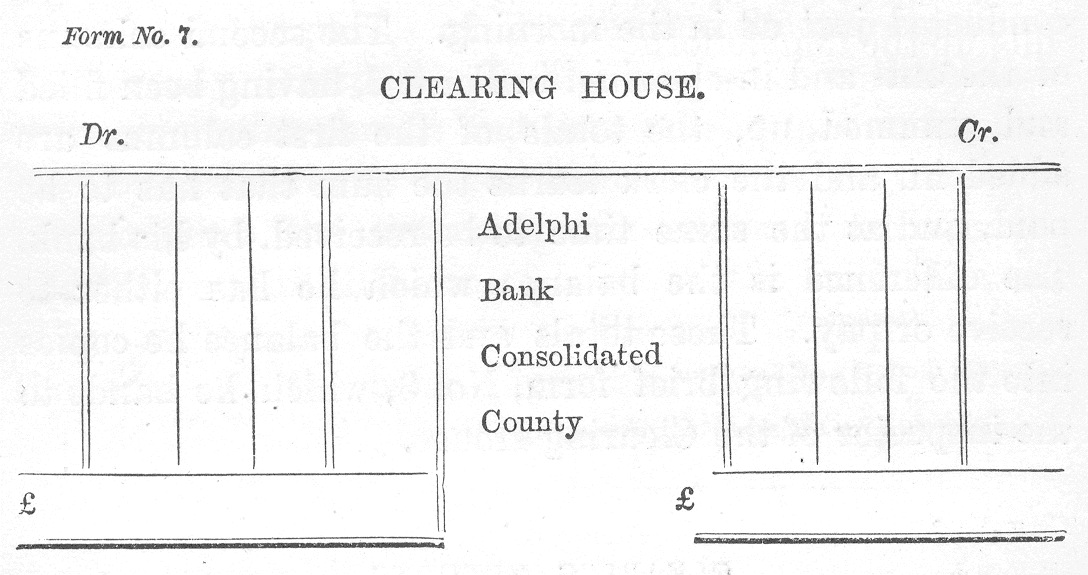
It is evident that the total which some of the banks have to receive on balance must equal what the others have to pay, because every cheque has been added in twice, once in favour of, and once against, some bank. If the debtor and creditor columns of the seventh form, being added up, fail to balance, some error of account must have been committed, and all the work is submitted to careful re-examination until the error is detected. When all is correct, it remains only to effect the payments, which is done by means of credit and debit notes, directing transfers in the books of the Branch Bank of England, to or from the accounts of the clearing bankers. The payments are made, indeed, to and from the Clearing House, as a kind of fictitious entity; but as its payments and receipts each day exactly balance, the Clearing House requires no separate ledger account, except for small current expenses, or inconsiderable errors.
To effect the transfer the clerk of each paying bank fills up the double form, No. 4, as follows:—
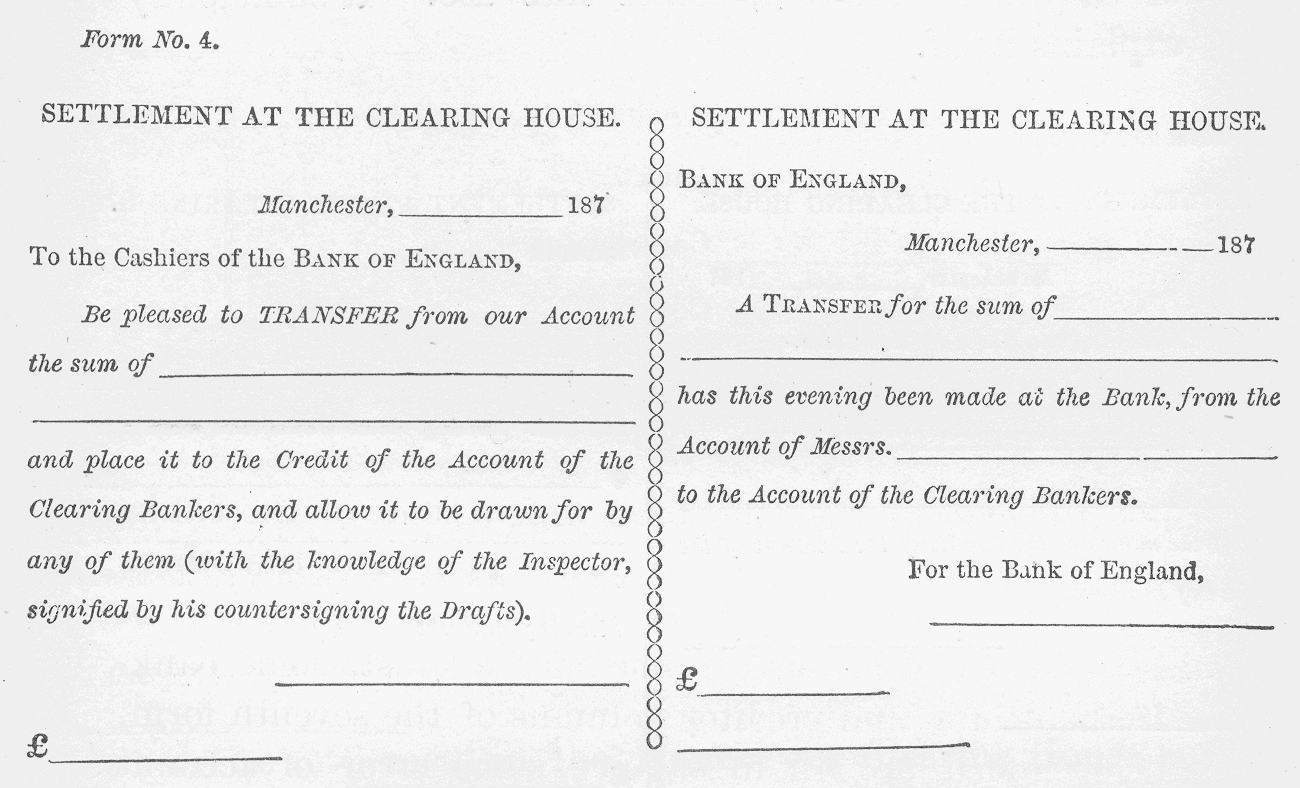
The coupon on the left-hand side is a draft to be signed by the clerk, if he has authority for the purpose, or else to be carried by him to his principals to be signed, and then paid into the Bank of England. It directs the cashier to credit the Clearing House with the balance, and debit the sum to the paying bank in question. The authorized official of the Bank of England signs the corresponding form on the right hand, when the payment is made, as a receipt for the sum on behalf of the Clearing House.
When, on the other hand, the balance is in favour of a bank, Form No. 5, printed on green paper for the sake of easy discrimination, comes into use. It sufficiently explains itself.
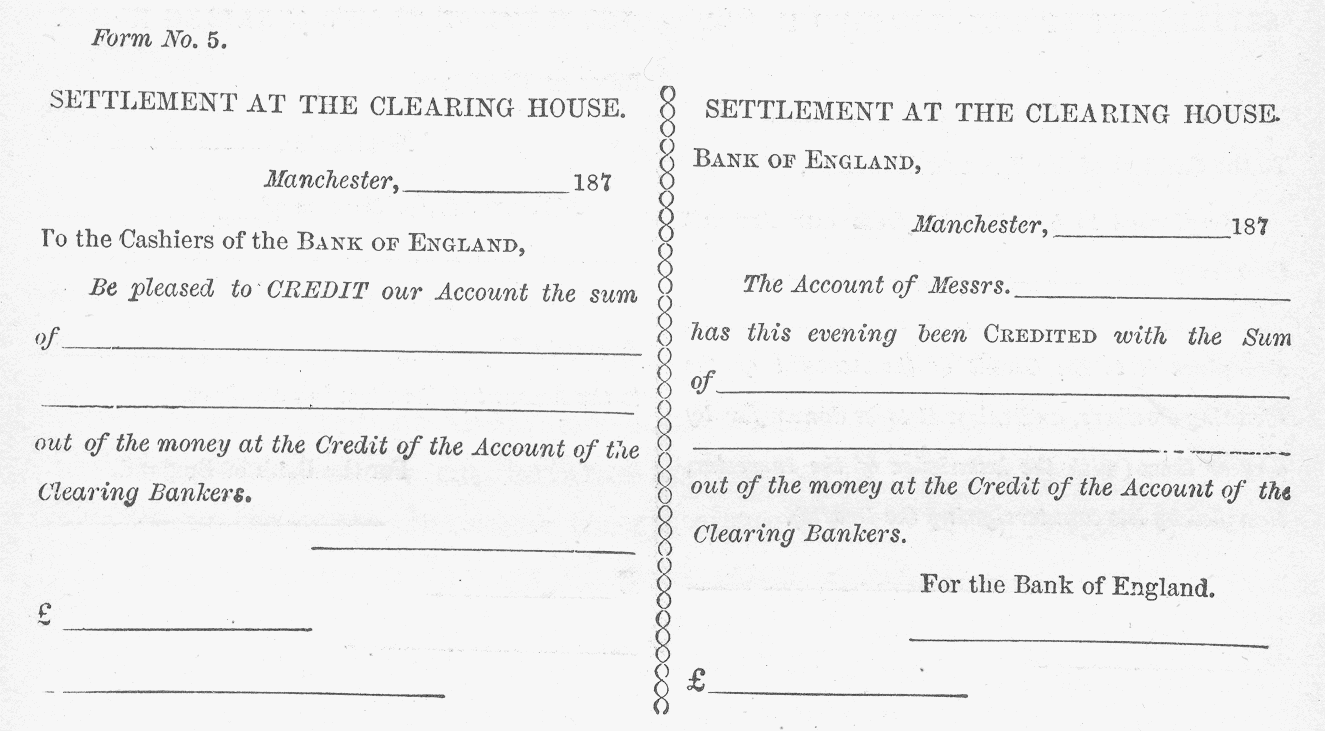
There remains then only the question of the returned cheques. Even these do not require cash payment. The balance at the close of the day is paid only provisionally, and those cheques which have to be dishonoured are returned within an hour to the bank presenting them. Unless the irregularities be explained away, or removed, the presenting cashier then signs the allowing form, No. 6, which is an acknowledgment that so much money too much was received by him at the last clearing. This form is included by the bank dishonouring the cheques, in its out-clearing parcel, and the matter is rectified in the balance of the next clearing.
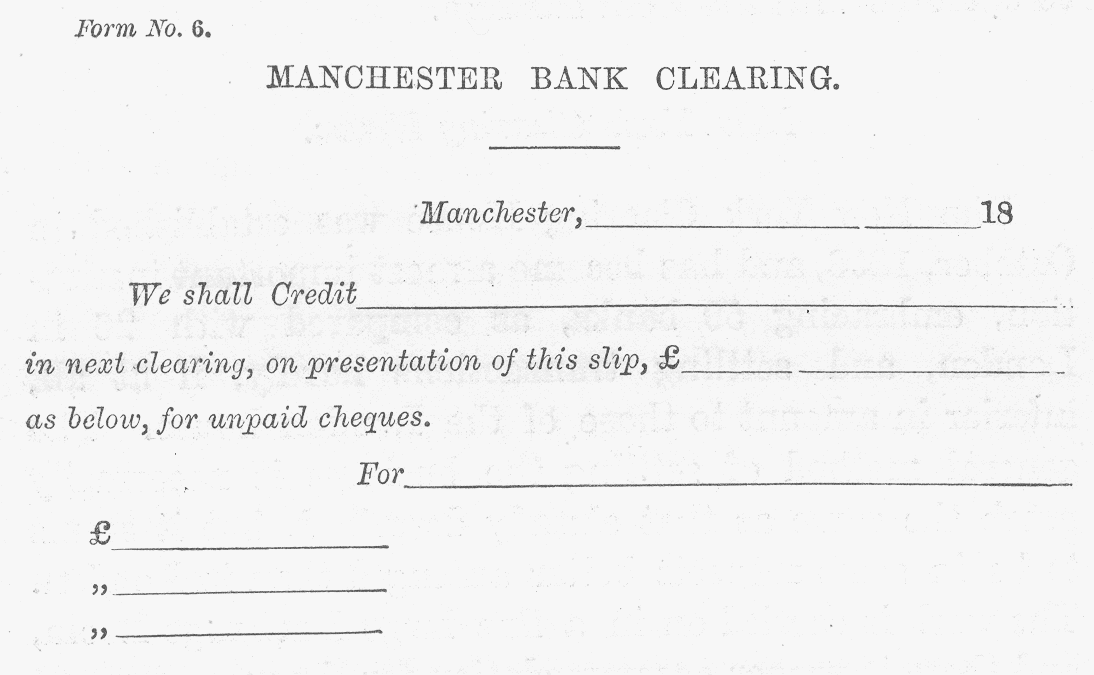
The settlement in the Manchester Clearing House is often effected in less time than it would take to read this account of the method, and the work goes on with noiseless ease, strongly contrasting with the turmoil of the London House. No doubt, the amounts cleared are comparatively insignificant in Manchester, the average daily sums being, in the years 1872, 1873, and 1874, respectively £226,160, £237,150, and £247,930, or little more than one-hundredth part of the daily transactions in the Lombard Street House.
The Manchester Clearing House is managed by a committee of bankers, of which the chief agent of the Bank of England in Manchester is the chairman, and the superintendence of the clearing work is conducted by an official of the Bank of England. Thus the Bank, while naturally taking precedence, harmoniously co-operates with the local bankers.
New York Clearing House.
The New York Clearing House was established in October, 1853, and has become a most important institution, embracing 59 banks, as compared with 26 in London, and settling transactions hardly, if at all, inferior in amount to those of the London house. The general method of settling the business is necessarily much the same as that already described, but it seems to be in some respects better arranged than in London. The work is carried on in a fine large Exchange Room, and there is proper accommodation for the manager and his clerks, instead of the small glass box in which the inspectors sit in the Lombard Street room.
Each New York bank has one settling clerk in the Exchange Room, besides a messenger, who brings and delivers the parcels of cheques and bills. The settling clerks sit in a series of desks arranged in an oval form in the middle of the spacious room, and the exchanges are effected by an equal number of messengers simultaneously walking round the desks, delivering the parcels of “out-clearing,” and receiving those of “in-clearing,” or as they are called in New York the
Credit and
Debit Exchanges. An account of the institution will be found in Gibbon’s work on “The Banks of New York; “but the general method of procedure is so far like that in England, that I need not again enter into the details, which I have had no opportunity of examining in person.
Extension of the Clearing System.
Until within the last few years there existed only two bankers’ clearing houses, those of Lombard Street and New York, but much progress has recently been made in extending a similar system to other places, and even to other branches of business. The Manchester Clearing House was established in July, 1872, and Newcastle has a similar establishment. On the continent only a single city has yet adopted the method. In Paris about eighteen bankers have formed an association, called a “Chambre des Compensations,” which is located in the Place de la Bourse, and balances the reciprocal claims of these firms much in the manner of the English clearing houses. In France, Germany, and other continental countries the use of the banker’s cheque is much less developed than in England and America. In Germany a person wishing to remit a hundred pounds will often collect the actual coins, seal them up in a bag with five seals, and register them at the post-office. Thanks to the excellent system of government
Postes existing in Germany, this method of remittance is sufficiently safe. But it is evident that where the monetary arrangements of a country are of such a kind there is no need of a clearing house.
The method of balancing claims needs by no means to be restricted to the business of banking. As, indeed, the monetary transactions of any locality come to a focus in the banks, the principal clearing will always be in the hands of bankers. But wherever a set of traders have numerous reciprocal claims, they may find it desirable to set up their own clearing house. As long ago as 1842, it occurred to Robert Stephenson and Mr. K. Morison, that the principle of the City Clearing House might be advantageously applied to settling the very complicated accounts arising between the railway companies, which have
through booking arrangements. The work constantly carried on in the great house full of accountants at Euston Square is vastly more complicated and various than that of a bankers’ clearing house; but the final result is to ascertain how much each railway company is indebted to each other one. The balance due to or from each company is then paid by a transfer at the bankers.
Within the last twelve months an attempt has been made, unsuccessfully as yet, to introduce the general use of cheques into Liverpool, where great sums of money are constantly passing, especially in the cotton market. For reasons which it would be difficult to trace out satisfactorily, the Liverpool merchants and bankers have never adopted the use of cheques to the same extent and in the same way as in other commercial towns. Many firms in Liverpool still refuse to receive payment by cheques, and only a year or two ago it was a common practice for a Manchester firm to send a clerk to Liverpool by railway with a bundle of bank-notes to make payments. At present, as I am informed, bank bills payable at sight, and forwarded by post, are substituted for Bank of England notes.
A Liverpool stock or cotton broker, wanting to make a payment, draws money out of his bank in notes and gold, and his clerks carry it about the town. Every evening a great number of small cash-boxes, containing large sums of money, are deposited at a well-known silversmith’s shop, opposite the Town Hall, for safe custody during the night. A great amount of capital is thus kept lying idle, and it is surprising that the bankers do not secure this sum, as an addition to their deposits, by removing every obstacle. At present the practice is to charge 1/8 or ¼ per cent. commission, whereas the actual cost of the accountants’ work by which the bank transfers are accomplished is almost nominal in regard to large transactions.
An important extension of the clearing principle was effected by the establishment, in 1874, of the London Stock Exchange Clearing House, which undertakes to clear, not sums of money, but quantities of stock. As stock brokers settle their transactions only once a fortnight, or in consols once a month, it naturally arises that, in the intervals, the same broker will usually have bought the same kind of stock for one client and sold it for another. The very same stock may leave passed through several different hands, and the same brokers may have had reciprocal dealings with each other. Instead, then, of actually making transfers of stock for each transaction, and paying by cheques which greatly swell the business of the Lombard Street Clearing House on settling days, a plan has been arranged, according to which each member of the Clearing House prepares a statement of the net amount of each stock which he has to receive from or deliver to each other member. The manager of the house, after verifying these accounts, which should balance in the aggregate, directs the debtor members to transfer quantities of stock to the creditor members in such a way as to close all the transactions. It will be noticed that, for pretty obvious reasons, the transfers are made in the stock exchange, directly from broker to broker, and not to the manager of the Clearing House, as in banking transactions. A separate clearing has, of course, to be made in each kind of stock. It is found that the quantities actually transferred do not exceed 10 per cent. of the whole transactions cleared, and the cheques drawn are diminished on settling days as much as ten millions sterling.
Still more recently the Cotton Brokers’ Association of Liverpool, although unable to apply the system of clearing as yet to their money transactions, have arranged a clearing system for the settlement of business connected with sales of cotton “to arrive.” Under the new arrangement the first seller and the last buyer come into contact, and all intermediate business, which sometimes occasioned much dispute and delay from contracts involving many middle-men, will be, as it were, cancelled by the Clearing House. The business, indeed, is being extended; so that all contracts, declarations, and payments will be effected through the agency of the association.
It may very well admit of question whether we have at all reached the limit of the advantageous application of the clearing principle. From bankers’ transactions it has been extended to railways, stock exchange, and cotton brokers’ business. It is conceivable that any other body of merchants, brokers, publishers, or others who have frequent pecuniary claims upon each other, might have a clearing meeting once or twice a week. Suggestions to this effect have already been made, and I am told that in the Glasgow iron market, a settlement day for the clearing of mutual transactions has been established.
Advantages of the Cheque and Clearing System.
Returning to the subject of the bankers’ Clearing Houses, it is to be remarked concerning the vast system of relations which now exists between English banks, that it has grown spontaneously, uninvented, unauthorized by the legislature, and only recognized by the judges when firmly established as a matter of business custom. No Act of Parliament has been passed to facilitate the operations of clearing, and it is only by an understanding between the banks, that the presentation of cheques and bills through the Clearing House, or their settlement by the payment of a balance, is regarded as legally valid.
The advantages of the system are evidently of enormous magnitude. All the larger payments are made with a minimum of risk, loss of time, trouble, or use of the precious metals. While the cheque representing a payment is travelling about the country, the money which it is transferring is reposing in the vaults of some bank, or rather, not being needed in the operation at all, is lent or sent out of the country, so that its interest is saved. We found in p. 165 that the loss of interest upon the metallic money now circulating or stored up in the United Kingdom, amounts to between four and five millions annually. If payments were now made by coin only, many times as much metallic money would be needed.
The security with which the payments are effected is also an element of importance. Specie when transmitted in large sums, is always a temptation to thieves, and has usually to be accompanied by one or more guards. Through the agency of banks, whether by crossed cheques or credit notes, the largest payments may be made with almost absolute immunity from risk. The cheques, bills, and other documents transferred in the clearing houses are, as a general rule, so crossed or endorsed as to be of no value to any one but the legal owners, and in any case are regarded by thieves as “duffer,” with which they dare not meddle.
Proportion of Cash Payments.
It is surprising to find to what an extent paper documents have replaced coin as a medium of exchange in some of the principal centres of business. In the
Statistical Journal for September, 1805, Sir J. Lubbock published some particulars concerning the business of his bank during the last few days of 1864. Transactions to the amount of £23,000,000 were effected by the use of coin and documents, as shown in the following statement:—
| Per Cent. | |
| Cheques and Bills passed through the Clearing House | 70.8 |
| Cheques and Bills not cleared . . . . . . . . | 23.3 |
| Bank of England Notes . . . . . . . . . . | 5.0 |
| Coin . . . . . . . . . . . . . . . . | .6 |
| Country Bank-notes . . . . . . . . | .3
|
| 100.0 |
The sums of money paid in by town customers amounted to £19,000,000, and when analysed gave the following results:—
| Per Cent. | |
| Cheques and Bills . . . . . . . . . | 96.8 |
| Bank of England Notes . . . . . . . . . | 2.2 |
| Country Bank-notes . . . . . . . . | .4 |
| Coin . . . . . . . . . . . . . . . . | .6
|
| 100.0 |
It is not for a moment to be supposed that these figures represent the average use of coin in banking transactions. The proportional amounts of different kinds of money and commercial documents used in different parts of the country, in different trades, or in banks of different size and character vary widely. It is much to be desired that bankers and others who have the facts before them should publish more copious information on the subject. In Manchester the use of Bank of England notes appears to be much more extensive than in London. Mr. R. H. Inglis Palgrave gave in the
Statistical Journal for March, 1873 (p. 86), an estimate prepared for him by Mr. Langton, the Managing Director of the Manchester and Salford Bank, of the proportion of cash payments made in that bank. It appears that coin and notes formed 53 per cent. of the total turn-over in 1859, 42 per cent. in 1864, and only 32 per cent. in 1872, so that a rapid decrease has been going on. But we find that in 1872 the amount of notes was still large, the turn-over of customers’ accounts being thus composed:—
| Per Cent. | |
| Cheques, Bills, etc.. . . . . . . . . | 68 |
| Bank-notes . . . . . . . . . | 27 |
| Coin . . . . . . . . . . . . . . . . | 5
|
| 100 |
I have endeavoured to form some notion of the comparative amounts of cheques and bills which are cleared off at successive points in the organization of the banking system. It is very desirable that we should learn what proportion the transactions of the Clearing House bear to the whole transactions of the banks of the kingdom. There would not be much difficulty in forming a fair estimate if we had from one or more banks in each of the principal towns a statement of the comparative amounts of cheques dealt with in various manners. According to information kindly furnished to me by the authorities of one of the principal banks of Manchester, I find that, during the months July to October, 1874, the cheques and bills on demand presented on or through the bank were disposed of as follows:—
| Per Cent. | |
| Cheques paid in Coin and Bank-notes over the Counter . . . | 34.2 |
| Cheques on Selves paid to Credit of Account . . . | 25.4 |
| Cheques presented through Manchester Clearing House . . . . | 22.5 |
| Cheques and Bills on demand on London presented through London Clearing House . . . . . . | 10.8 |
| Cheques on Country Bankers presented through the London Clearing House | 3.5 |
| Cheques on Country Bankers presented direct . . | 3.6
|
| 100.0 |
Although considerable trouble has been spent in the preparation of this account, it seems doubtful whether the items are complete and correct, and I give it more as a specimen of the kind of information which is much wanted than as a reliable statement.
Cases to which the Clearing System is inapplicable.
It will now be sufficiently apparent that, so long as trade is reciprocal, the cheque and clearing system can arrange all exchanges without the use of coin. The values of goods are estimated and expressed in terms of gold, which acts as the common denominator of value, but metallic money ceases to be the medium of exchange. The banking organization effects what I have heard Mr. W. Langton describe, as a
restoration of barter. But it happens in some cases that transactions are not reciprocal, and cannot be made to balance. In certain trades there is a permanent
set of the goods in one direction. In the Manchester cotton trade, for instance, the manufacturers in purchasing cotton from the Liverpool merchants, pay with cash or short credits. The goods when completed are often shipped again at Liverpool for foreign consignees at long credits, but are not generally purchased by the Liverpool merchants. Consequently, while the Manchester manufacturer owes the Liverpool merchant for the whole cost of the raw material, and for the shipping charges and freight upon the goods sent abroad, there are no equivalent claims of Manchester merchants against Liverpool. The foreign consignees of the goods pay for them by bills upon London. Now if the Manchester manufacturers held their funds in Manchester, and the Liverpool merchants their funds in Liverpool, there would have to be a constant current of money from London to Manchester, and from Manchester to Liverpool, whence it would go abroad to pay for the raw material. This inconvenient state of things is remedied to a certain extent, as we shall see in Chapter XXIII., by making London the head-quarters and clearing house both of home and foreign transactions.
But there is always a liability that claims expressed in metallic money, and actually capable of being demanded in that shape at the option of the owner, will sometimes be pressed. In certain states of trade, or under certain contingent circumstances, the holders of cheques require gold, and bankers who have become accustomed to consider metallic reserves as almost superfluous, find themselves suddenly in a difficult position. Such, as we shall see in Chapter XXIV., is the real cause of the present instability of the English money market.
